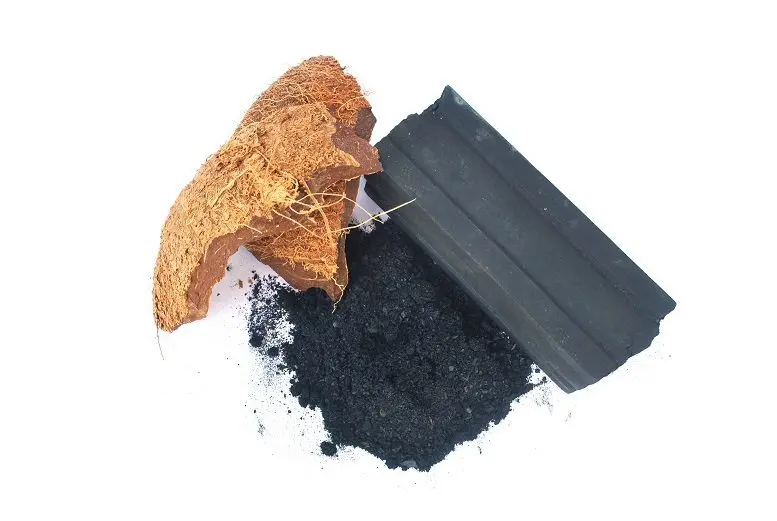Properly done coal filtration (cleaning) of moonshine not only partially removes harmful impurities, but also forms a characteristic vodka flavor in grain and sugar distillates. Due to availability, more and more experienced distillers use activated coconut charcoal (KAU-A brand), which has several advantages over similar birch charcoal.
Theory
Activated coconut charcoal is a natural, environmentally friendly absorbent made from coconut shells by heating to a high temperature without air access. The essence of activation is to open the maximum possible number of pores on the carbon-containing material (in our case, the shell) to obtain a high degree of absorption.
In addition to the total number, the size of micropores is also important, on which the ability of coal to absorb certain molecules of harmful substances depends – small molecules easily pass through large pores. In this indicator, coconut charcoal is superior to birch charcoal, and even more so pharmacy charcoal.

Attention! Use only KAU-A activated coconut charcoal, as similar for hookahs and other filter systems may contain impurities and additives that will get into the alcohol.
The advantages of coconut charcoal for cleaning moonshine over birch and pharmacy charcoal:
- has more micropores of a smaller size, which increases the filtration efficiency, absorbs up to 80% of essential oils and up to 90% of esters;
- savings – for 1 liter of distillate with a strength of 40 degrees, you need 10 grams of coconut charcoal, which is 5 times less than birch charcoal;
- slightly dusty, which contributes to easy cleaning of the drink from the coal itself.
Not always the use of activated carbon is designed to purify the drink from harmful impurities. For example, even with the same strength, vodka is more pleasant than alcohol diluted with water – it does not “burn” the oral cavity so much and is softer in taste. At the same time, after rectification, there are no impurities left in alcohol that coal can remove.
Another effect is triggered – the partial oxidation of the aldehydes contained in alcohol to acids under the influence of air remaining in the pores of the coal. As a result, esters are formed, which soften the taste. It is difficult to achieve a slight oxidation of aldehydes by other methods, which is why in distilleries sorting (a mixture of water and alcohol) is passed through coal.
Technology for cleaning moonshine with coconut charcoal
Purify only sugar and grain distillates, because in addition to harmful substances, molecules remain in the pores that are responsible for the aroma and taste of fruit moonshine. As a result, the smell of apples, cherries, other fruits and fruits disappears.
Sequence:
- Dilute moonshine with water. If there is a second distillation – up to 18-20%. If re-distillation is not planned – up to 40-50%. The lower the strength, the higher the degree of purification, since the molecular bond is weaker.
- Grind the coal into pieces 1-4 cm in size (if the manufacturer did not do this). Weed out the dust.
- Pour the sifted coal into a glass container, it is most convenient – in a jar. Proportions – 10 grams of KAU-A activated coconut charcoal (about 2 tablespoons) per 1 liter of moonshine in terms of a fortress of 40 degrees. Excess will not harm, but will not improve the quality of the filtration.
- Mix, seal tightly. Leave for 3-4 days in a dark place at room temperature. Shake the container every 8-12 hours (preferably).
- Strain the purified moonshine through gauze or a strainer, then filter from the remnants of coal through cotton wool or a coffee filter.
- The finished distillate must be absolutely transparent. Do a fractional distillation (recommended) or just bottle for storage.









